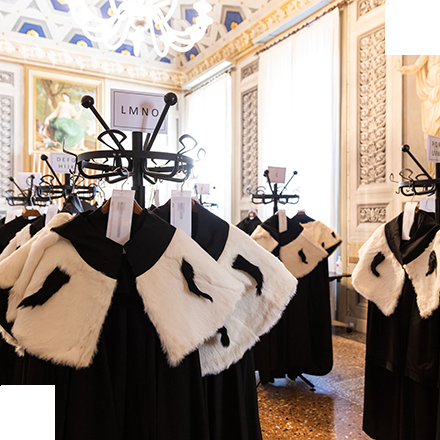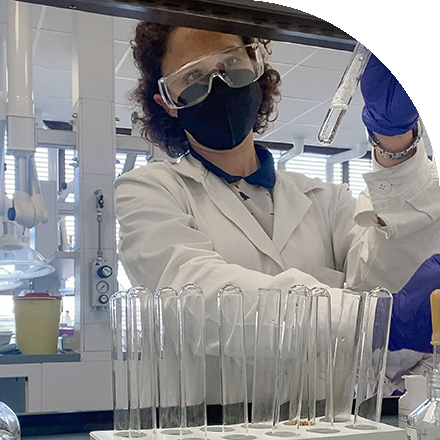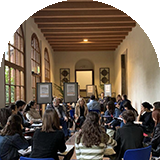Università Cattolica del Sacro Cuore Largo A. Gemelli, 1 - 20123 Milan
Federica D'Alessandra
Human Rights Officer for the International Law Association and Consultant for the Public International Law & Policy Group
His name has been included in Forbes' list of the most influential Under 30 in the world. Originally from Sicily, Federica D'Alessandra studied international law at the Faculty of Political Science at the Catholic University of Milan and made her vocation to public service a life choice. He now lives in New York, where he works as a human rights officer for the International Law Association and a consultant for the Public International Law & Policy Group.
How did the vocation that led you to fight for human rights come about?
Our country boasts a legal tradition of excellence that has always fascinated me. My history from the post-war period to European integration, with all that this has brought us stability, prosperity and peace, has always fascinated me. Growing up in Sicily, then, it was the nature of the fight against the mafia that opened my eyes to the power of the Law and Institutions, the importance of the Rule of Law. Having decided at a very young age to volunteer in remote regions of Sub-Saharan Africa I think did the rest. After having experienced first-hand the consequences of hunger, war, corruption, and extreme poverty, I knew and was convinced that I wanted to work so that every human being would be recognized as having his or her dignity and his or her rights guaranteed.
The protection of rights, however, is not a function in itself. As I said, my vocation is public service in the broadest sense of the word. For this reason, I would like to participate one day not only in the formulation of public policies, but also in the regular performance of the functions of the institutions invested with the sacrosanct power to protect our rights and duties more generally.
Have you ever influenced and perhaps modified the intentions of the powerful with your work?
The nature of my work is to provide technical advice. Especially when this advice is directly solicited, yes, I like to believe that it is taken into account, but I certainly cannot take it for granted. However, the intentions (and decisions) of the "powerful" are determined by many, too many factors for the influence of the work of a single person (or entity) to be quantified. And in any case, not all of them are technical factors. I had opportunities for exchange, both formal and informal, with key players in important negotiations and decisions. So, in my own small way, perhaps I think I have sometimes had the opportunity to present my point of view at the political-strategic level as well. What matters in my opinion, however, is not the specific imprint you leave behind, other than the possibility of being at the negotiating table (or behind the scenes, as is much more often the case). I consider myself very lucky to have a voice. Even if it's minimal, even if it's occasionally, having a voice is important.
After the election of Donald Trump, what were the reactions to the strongest statements of the new president by those who, like you, fight for human rights?
Of dismay, and outrage, to tell the truth. From the "reintroduction of torture" that the President promised during the election campaign, to his promises to leave the UN Human Rights Council, and cutting funding to both the UN and the State Department (the part of the US government that has jurisdiction over human rights, among other things), his policies are the exact opposite of what many see as necessary. if not desirable. The whole world is at a crossroads, and while in some respects it is true that we must not and cannot continue to take American leadership for granted, historically America's withdrawal from international affairs has not had good results.
From Trump to Hungary, more and more countries are preparing to build walls. What do you "insiders" do to stem these xenophobic drifts?
Walls are a symptom of a much deeper evil than xenophobia: they are the result of citizens' dissatisfaction with their institutions, mixed with resentment and a sense of abandonment that many have perhaps always felt, but which has been reinforced with the outbreak of the world economic crisis. Historically, in times of crisis, mankind has always tended to find scapegoats. Nowadays the scapegoat is the refugees. Migration, on a global level, may be regulated, but it cannot be stopped.
As far as we are concerned, we "insiders" try to disseminate, as much as possible, real and factual information that can dismantle the images that are formed in the minds of those who are poorly informed. The economic benefits of migration are not understood by everyone, and communicating to citizens how they, along with the rest of society, can benefit are certainly a constructive way of engaging in dialogue. We have a moral obligation to welcome those fleeing wars and natural disasters. For this to be possible, however, it is necessary that the right policies are implemented and that everyone (including the various governments) does their part in making sure that access to services and resources is as adequate as possible.
Have you personally followed events related to the tragedies of migrants or the war in Syria?
The tragedy of the Syrian civilian population is my daily anguish. Not a day goes by without a meeting, a letter, a speech not being made for the Syrian people. This war, and the crisis that ensued, will remain an indelible stain on the collective consciousness of the international community.
In which area are there currently the greatest human rights violations?
Undoubtedly, the worst atrocities are committed in Syria, but also in Yemen and South Sudan. In general, however, 2016 was a terrible year from a human rights perspective. Torture, unlawful detention, and mass executions remain common in too many countries in the Middle East, Asia, and sub-Saharan Africa. Even in Latin America, in the context of the so-called "war on drug trafficking", abuses against defenceless civilian populations continue to be perpetrated. However, terrorism seems to be the most worrying threat. And not because it inflicts more losses, but because it is a problem that at the strategic and structural level we are not yet ready to tackle in a clear and organic way.
What memories do you have of your years as a student at the Catholic University of Milan?
I have a lot of them. I remember my classmates and professors. In particular, the lectures of Professor Paolo Colombo, who fascinated me for the contents and the interactive method of instruction. I also remember the course of the then Rector, Professor Lorenzo Ornaghi, with whom, among other things, I had the privilege of graduating. I remember the lectures of Professor Damiano Palano, who always cited studies by Harvard professors with whom I find myself today, perhaps even in the Faculty Council. I remember the Graduate School of Economics and International Relations (ASERI), where I had the opportunity to participate in some courses. I remember the central library, beautiful, as well as the rest of the university. I also remember my life at Paolo VI, the university college where I was staying, the famous Sister Stella and Monica, the unbeatable chef of the collegiate canteen, who always had a lot of patience with me, then one of the very few vegetarians in the dining room. The university years are incredible years, in which you learn so much about yourself and others. I am very happy to have spent them at Cattolica. I think it is really one of the universities that offers the most in Italy.
After university, what were the steps that led you to start a career path?
To tell the truth, I began to take some steps - I think crucially - already at university. From the point of view of the educational offer, I made sure to accumulate as much foreign experience as I was allowed, from the UN Model Italy – the simulation of UN sessions – to volunteering in Congo, from Erasmus in France to the thesis in the United States. I believe that being exposed, thanks to the opportunities offered by Cattolica, to different realities seriously encouraged me to find my way. During university, I also obtained an internship at the American Consulate in Milan for almost a year. That experience also changed me a lot. Witnessing, at such a young age, the seriousness and solemnity with which the American officers of diplomatic careers carried out their duties and the seriousness they also and above all showed towards me greatly strengthened my passion for public service.
A crucial internship...
The American work ethic opened my eyes to the fact that skills are acquired by working, and that it is important to demonstrate a desire to do, flexibility, and a spirit of initiative, but also the ability to learn, and to do it quickly. It taught me the value of "feedback", of attention to detail, and it taught me to relate to much more experienced and important people on a professional level. It has also helped me acquire the language skills without which you don't get anywhere. These are all things that I was able to take advantage of when I moved to the United States, first for my thesis, then for a second internship.
Where did this second chance lead you?
I was a research assistant to Sarah Sewall, then director of the National Security and Human Rights program at the Kennedy School, who later became Under Secretary of State for Civil Security and Human Rights in the second Obama administration. A resolute woman from whom I learned so much. Professionally, academically, and personally. I worked so hard to get it approved! The efforts were noticed by the then director of the center, Charlie Clements, who offered me first an extension of the internship, and then a contract. In those wonderful years I learned everything I know today about mass atrocities, and how the mobilization of national and international forces can have unpredictable impacts on preventing and stopping these tragedies. I learned the true value of relations between civilians and the military, an awareness that led me to specialize in humanitarian law, public law, and law of international organizations.
A path in crescendo...
Thanks to the Harvard experience, I approached the world of international courts, first from an institutional point of view, then also from an operational and jurisprudential point of view, with the consequent decision to move to the Netherlands for some time and continue my studies in international law. I have approached professional networks such as the American Society of International Law and the International Bar Association - within which I now have a leadership position within, for example, the War Crimes Committee, the Human Rights Committee, and the Council of the Section on Public and Professional Interest - without ever severing the relationship with Harvard. And it was precisely this relationship, strengthened by the path of enrichment of the professional profile that I started, that launched me into my current position.
In the light of your experience, what would you recommend and suggest to young students and recent graduates of your university?
Don't get discouraged, don't throw in the towel, keep dreaming and above all believe in yourself and your abilities. Not to be afraid to get involved and look for the right opportunities that, although sometimes difficult to find and still highly competitive, exist. Of course, they are not enough. Although Cattolica does an excellent job during and after graduation, much more needs to be done at the institutional level to help young people in Italy, because there are so many talents. On the other hand, however, I sometimes see some young people who are lulled or who want the opportunities served on the plate. I tell them to wake up and become aware, because their future, like that of our country, is also in their hands.
Presenza, 2017 - Ne ha fatta di strada di Ilaria Mauri






